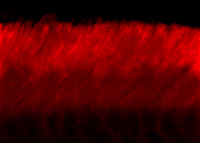ABCA4 (Rim Protein) Antibody
Mouse monoclonal antibody
- SPECIFICATION
- CITATIONS
- PROTOCOLS
- BACKGROUND

Application
| IHC |
|---|---|
| Primary Accession | O35600 |
| Reactivity | Bovine, Human, Mouse, Xenopus |
| Host | Mouse |
| Clonality | monoclonal |
| Isotype | IgG |
| Clone Names | 3F4 |
| Calculated MW | 220 KDa |
| Gene ID | 11304 |
|---|---|
| Gene Name | ABCA4 |
| Other Names | Retinal-specific ATP-binding cassette transporter, ATP-binding cassette sub-family A member 4, RIM ABC transporter, RIM protein, RmP, Abca4, Abcr |
| Target/Specificity | Partially purified bovine 220-kDa disc rim protein. |
| Dilution | IHC~~ 1:100 |
| Format | Protein G purified culture supernatant |
| Antibody Specificity | Specific for ABCA4 |
| Storage | Maintain refrigerated at 2-8°C for up to 6 months. For long term storage store at -20°C in small aliquots to prevent freeze-thaw cycles. |
| Precautions | ABCA4 (Rim Protein) Antibody is for research use only and not for use in diagnostic or therapeutic procedures. |
| Shipping | Blue Ice |

Thousands of laboratories across the world have published research that depended on the performance of antibodies from Abcepta to advance their research. Check out links to articles that cite our products in major peer-reviewed journals, organized by research category.
info@abcepta.com, and receive a free "I Love Antibodies" mug.
Provided below are standard protocols that you may find useful for product applications.
Background
ABCA4 (ATP-binding cassette, sub-family A (ABC1), member 4, Rim Protein) is a member of the superfamily of ATP-binding cassette (ABC) transporters (Illing et al., 1997). ABC proteins transport various molecules across extra- and intracellular membranes. This protein is a retina-specific ABC transporter with N-retinylidene-PE as a substrate. It is expressed exclusively in retina photoreceptor cells, indicating the gene product mediates transport of an essential molecule across the photoreceptor cell membrane. Mutations in this gene are found in patients diagnosed with Stargardt disease and are associated with retinitis pigmentosa-19 and age-related macular degeneration (Wiszniewski et al., 2003). Defects in ABCA4 are the cause of Stargardt disease type 1 (STGD1) (Molday et al., 2000). STGD is one of the most frequent causes of macular degeneration in childhood. Defects in ABCA4 are also known to cause fundus flavimaculatus (FFM), age-related macular degeneration type 2 (ARMD2) and cone-rod dystrophy type 3 (CORD3) (Klevering et al., 2005).
References
Michelle Illing, Laurie L. Molday and Robert S. Molday. The 220-kDa Rim Protein of Retinal Rod Outer Segments Is a Member of the ABC Transporter Superfamily. J. Biol. Chem., (1997) Vol 272 (15) I April 11. 10303-10310.
Klevering BJ, Deutman AF, Maugeri A, Cremers FP, Hoyng CB (2005) The spectrum of retinal phenotypes casued by mutations in the ABCA4 gene. Graefes Arch Clin Exp Ophthalmol. 243(2):90-100.
Molday, L. et al., ABCR expression in foveal cone photoreceptors and its role in Stargardt macular dystrophy. Nature Genetics (2000) 25, 257 - 258.
Wiszniewski, W. et al., ABCA4 mutations causing mislocalization are found frequently in patients with severe retinal dystrophies. Human Molecular Genetics (2005) 14(19):2769-2778.
If you have used an Abcepta product and would like to share how it has performed, please click on the "Submit Review" button and provide the requested information. Our staff will examine and post your review and contact you if needed.
If you have any additional inquiries please email technical services at tech@abcepta.com.













 Foundational characteristics of cancer include proliferation, angiogenesis, migration, evasion of apoptosis, and cellular immortality. Find key markers for these cellular processes and antibodies to detect them.
Foundational characteristics of cancer include proliferation, angiogenesis, migration, evasion of apoptosis, and cellular immortality. Find key markers for these cellular processes and antibodies to detect them. The SUMOplot™ Analysis Program predicts and scores sumoylation sites in your protein. SUMOylation is a post-translational modification involved in various cellular processes, such as nuclear-cytosolic transport, transcriptional regulation, apoptosis, protein stability, response to stress, and progression through the cell cycle.
The SUMOplot™ Analysis Program predicts and scores sumoylation sites in your protein. SUMOylation is a post-translational modification involved in various cellular processes, such as nuclear-cytosolic transport, transcriptional regulation, apoptosis, protein stability, response to stress, and progression through the cell cycle. The Autophagy Receptor Motif Plotter predicts and scores autophagy receptor binding sites in your protein. Identifying proteins connected to this pathway is critical to understanding the role of autophagy in physiological as well as pathological processes such as development, differentiation, neurodegenerative diseases, stress, infection, and cancer.
The Autophagy Receptor Motif Plotter predicts and scores autophagy receptor binding sites in your protein. Identifying proteins connected to this pathway is critical to understanding the role of autophagy in physiological as well as pathological processes such as development, differentiation, neurodegenerative diseases, stress, infection, and cancer.


